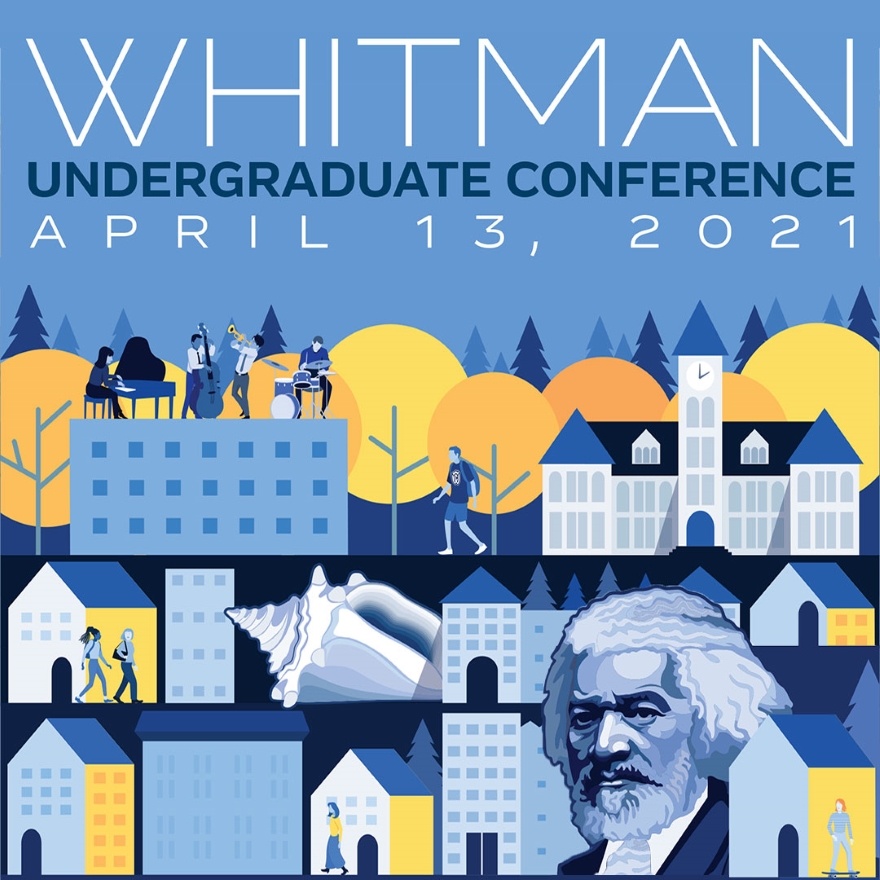Virtual Undergraduate Conference Sparks Engaging Discourse
By Whitney Rich ’20 and Genevieve Vogel ’24

In its 23rd year, the Whitman Undergraduate Conference is an opportunity for students to present their original research from classes, senior theses, study abroad projects and summer internships. The 2021 conference showcased the work of 118 students and, adapting to the times, was held virtually. Presentations were pre-recorded and shown during the 16 panels, followed by a live Q&A session with attendees.
Keith Raether, director of fellowships and grants, and Jenny Stratton, administrative assistant for fellowships and grants, were instrumental in organizing the event and adapting it for a virtual format. The annual conference is organized by the Office of Fellowships and Grants, now part of the Student Engagement Center.
In a pre-recorded address to open the event, Provost Alzada Tipton noted the important connections being made with the academic theme. “The college’s Race, Violence and Health academic theme this year has captured and challenged the Whitman community through guest lectures, fresh curriculum, collaborative and independent research projects, and diverse student initiatives. This year’s conference is closely aligned to that theme. We have three full panel sessions dedicated to work inspired by the theme—with panels on justice on identity, equity and disparity and on health.”
In the morning panel on Climate and Communities, senior environmental humanities majors Liam Voorhees and Jacob Klusmeier presented “Trolling Dead Waters: Witnessing an Age of Extinction”. Spanning from the Yakima River Basin to Southeast Alaska, their presentation on salmon extinction considered the significance of the species to Native American culture.
Voorhees and Kulsmeier pointed out that the current amount of salmon traveling up the Yakima River is a third of what it was before 1977, when intervention with damming truly took hold. Climate change has also altered the environment—snowfall has decreased and ocean acidification has increased. Today, the Yakima Nation has led the push for the Yakima River Enhancement Plan to improve the river habitat and salmon numbers.
“The fate of salmon rests in human hands,” says Voorhees, a recipient of the Watson Fellowship. “Conservation work, habitat, is really where it’s at. Protecting those streams and water quality is really vital for these fish.”
The Cordiner Hall poster session, where students showcase their data, methods and research findings on posters, also took on a virtual format this year. The Whitman community was invited to join the poster presenters in a simulated Cordiner Hall via Gather, an online conference platform. Each person was represented by a tiny avatar that could move about the space. When the avatar approached a poster, a live video feed would display and the presenters and audience could ask questions and discuss the research findings.
Senior psychology major Emily Solomon and her thesis partners, Ben Weitzel and Ava Randall, also senior psychology majors, presented their research on the correlation between depression and emotional intelligence in undergraduate students.
“I really enjoyed the opportunity to chat with others about my thesis, even in a virtual setting. I'm glad our group decided to participate in the poster session because it allowed for more one-on-one conversations about our research, and was a great chance to connect with others about the work they’ve been doing,” says Solomon.

A chamber music interlude featured the musical talent of students Julia Schillings, Jack Fleming, Elsa Batten and Liam Dubay. During the lunch hour, a jazz workshop gave a glimpse into the process that musicians, versed in improvisation, have developed during the pandemic to continue creating, arranging, redesigning and recording music—in isolation from one another. The day ended in music with the “Composers Studio Concert,” a pre-recorded concert from the creative talents of Whitman student composers Liam Dubay, Jongwoo Lee, Ronja Mokranova and Cameron Solon.
Junior German studies and politics double major Bridget O’Brien presented “From Nazi Germany to Trump: How Language Shapes Our Moral Reality” during the afternoon Margins of Morality and Truth panel. Her presentation emphasized the coercive power of language. The language of totalitarians, she explained, intends to dominate individuals.
O’Brien discussed the Nazi phrase “Final Solution” to describe the mass extermination of Jewish people. "Instead of referring to the actual thing they were committing, genocide, they talked about it as a ‘Final Solution.’” O’Brien argued that presenting this false narrative aided in “denying the reality of the action they were committing.” She made comparisons to Trump’s excessive use of bragging, cliches and slogans, all ways to render language “meaningless.” Restoring personal responsibility, she said, could prevent thoughtless language in our everyday lives.
Descriptions and recordings of the 83 presentations and images and abstracts for the 23 posters as well as recordings of the concerts and the jazz workshop are available on the Whitman Undergraduate Conference webpage.